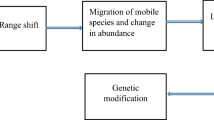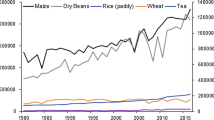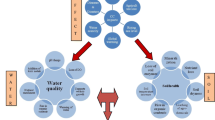Abstract
Future warming predicted for Tunisia may reduce winter chill and affect the production of tree fruits and nuts, one of the key sectors of the country’s economy. To assess past and future chill availability, we used weather records from 1973 to 2019 to simulate historic and future chill for 20 weather stations (16 from Tunisia, 3 from Algeria and 1 from Libya) by generating 6 past scenarios and 72 future scenarios for 2041–2070 and for 2071–2100, for two Representative Concentration Pathways (RCP4.5 and RCP8.5). We selected three future scenarios representing optimistic, intermediate, and pessimistic outlooks. Safe Winter Chill (SWC; in Chill Portions) was calculated using the Dynamic Model based on data for 100 winter seasons produced with a weather generator. SWC was then mapped for the whole country. Chilling requirements for typical Mediterranean fruit species (almond, pistachio, and peach cultivars) were compared with future SWC to select the best adapted fruit species, and cultivars within species, for each region. Our findings revealed severe SWC decline in the recent past. This decline will continue in the course of the twenty-first century. At the end of the century, we expect few of the studied species and cultivars to be able to fulfill their chilling requirements. By that time, only almonds may remain viable, whereas pistachios and peaches may experience alarming chill shortfalls. While our findings paint a grim picture for Tunisia’s orchards, they also allow insights for many other important fruit-growing regions with Mediterranean climate.



Similar content being viewed by others
References
Agricultural Investment Promotion Agency (2019) Tunisian agriculture (in French). http://www.apia.com.tn/agriculture-tunisienne.html. Accessed 8 Apr 2019
Arreola-Avila JG, Núñez-Barrios A, Vargas-Piedra G et al (2011) Hydrogen Cyanamide increases pistachio (Pistacia vera L.) bud break in arid regions with insufficient chilling. Rev Chapingo Ser Ciencias For y del Ambient XVII:259–265. https://doi.org/10.5154/r.rchscfa.2010.10.056
Baldocchi D, Wong S (2008) Accumulated winter chill is decreasing in the fruit growing regions of California. Clim Chang 87:S153–S166. https://doi.org/10.1007/s10584-007-9367-8
Beede RH, Ferguson L (2002) Effect of rootstock and treatment date on the response of pistachio to dormant applied horticultural mineral oil. Acta Hortic 591:53–56
Benmoussa H, Ghrab M, Ben Mimoun M, Luedeling E (2017a) Chilling and heat requirements for local and foreign almond (Prunus dulcis Mill.) cultivars in a warm Mediterranean location based on 30 years of phenology records. Agric For Meteorol 239:34–46
Benmoussa H, Luedeling E, Ghrab M et al (2017b) Performance of pistachio (Pistacia vera L.) in warming Mediterranean orchards. Environ Exp Bot 140:76–85
Benmoussa H, Ben Mimoun M, Ghrab M, Luedeling E (2018) Climate change threatens central Tunisian nut orchards. Int J Biometeorol 62:2245–2255. https://doi.org/10.1007/s00484-018-1628-x
Campoy JA, Ruiz D, Egea J (2011) Dormancy in temperate fruit trees in a global warming context: a review. Sci Hortic (Amsterdam) 130:357–372. https://doi.org/10.1016/j.scienta.2011.07.011
Campoy JA, Ruiz D, Allderman L et al (2012) The fulfilment of chilling requirements and the adaptation of apricot (Prunus armeniaca L.) in warm winter climates: an approach in Murcia (Spain) and the Western Cape (South Africa). Eur J Agron 37:43–55. https://doi.org/10.1016/j.eja.2011.10.004
Cordano AE, Eccel E (2014) Package “ RMAWGEN ” - Weather Generator R package version 1.3.0. http://cran.r-project.org/web/packages/RMAWGEN/index.html
Crossa-Raynaud P (1955) Effets des hivers doux sur le comportement des arbres fruitiers à feuilles caduques: observations faites en Tunisie à la suite de l’hiver 1954-1955. Ann Serv Bot Agron Tunisie 28:1–22
Darbyshire R, Webb L, Goodwin I, Barlow S (2011) Winter chilling trends for deciduous fruit trees in Australia. Agric For Meteorol 151:1074–1085. https://doi.org/10.1016/j.agrformet.2011.03.010
Darbyshire R, Webb L, Goodwin I, Barlow EWR (2013) Impact of future warming on winter chilling in Australia. Int J Biometeorol 57:355–366. https://doi.org/10.1007/s00484-012-0558-2
Darbyshire R, Measham P, Goodwin I (2016) A crop and cultivar-specific approach to assess future winter chill risk for fruit and nut trees. Clim Chang:541–556. https://doi.org/10.1007/s10584-016-1692-3
Elloumi O, Ghrab M, Kessentini H, Ben Mimoun M (2013) Chilling accumulation effects on performance of pistachio trees cv. Mateur in dry and warm area climate. Sci Hortic (Amsterdam) 159:80–87. https://doi.org/10.1016/j.scienta.2013.05.004
Erez A (1995) Means to compensate for insufficient chilling to improve bloom and leafing. Acta Hortic 395:81–95
Erez A (2000) Bud dormancy; phenomenon, problems and solutions in the tropics and subtropics. In: Erez A (ed) Temperate fruit crops in warm climates. Kluwer Academic Publishers, Israel, pp 17–48
Erez A, Yablowitz Z (1997) Effect of dormancy breaking agents with Armobreak in the peach. Acta Hortic 41:183–190
Erez A, Couvillon GA, Hendershott CH (1979) The effect of cycle length on chilling negation by high temperatures in dormant peach leaf buds. J Am Soc Hortic Sci 104:573–576
Erez A, Yablowitz Z, Aronovitz A, Hadar A (2008) Dormancy breaking chemicals; efficiency with reduced phytotoxicity. Acta Hortic 772:105–112
Fadón E, Fernandez E, Behn H, Luedeling E (2020) A conceptual framework for winter dormancy in deciduous trees. Agronomy 10(2):242. https://doi.org/10.3390/agronomy10020241
Farag AA, Khalil AA, Hassanei MK (2010) Chilling requirement for deciduous fruits under climate change in Egypt. Res J Agric Biol Sci 6:815–822
Fernandez E, Whitney C, Cuneo IF, Luedeling E (2020) Prospects of decreasing winter chill in Chile throughout the 21st century. Clim Chang. https://doi.org/10.1007/s10584-019-02608-1
Finetto GA (2004) The behaviour of some apple rootstocks in relation to the chilling requirement. Acta Hortic 662:245–251
Fishman S, Erez A, Couvillon GA (1987a) The temperature dependence of dormancy breaking in plants: mathematical analysis of a two-step model involving a cooperative transition. J Theor Biol 124:473–483. https://doi.org/10.1016/S0022-5193(87)80221-7
Fishman S, Erez A, Couvillon GA (1987b) The temperature dependence of dormancy breaking in plants: computer simulation of processes studied under controlled temperatures. J Theor Biol 126:309–321. https://doi.org/10.1016/S0022-5193(87)80237-0
Fraga H, Pinto JG, Santos JA (2019) Climate change projections for chilling and heat forcing conditions in European vineyards and olive orchards : a multi-model assessment. Clim Chang 152:179–193
Gaaliche B, Ghrab M, Ben Mimoun M (2016) Effect of hydrogen cyanamide on vegetative growth, yield, and fruit quality of fig cv. Zidi in a warm production area. Int J Fruit Sci. https://doi.org/10.1080/15538362.2016.1202169
George AP, Lloyd J, Nissen RJ (1992) Effects of hydrogen cyanamide, paclobutrazol and pruning date on dormancy release of the low chill peach cultivar flordaprince in subtropical Australia. Aust J Exp Agric 32:89–95. https://doi.org/10.1071/EA9920089
Ghrab M, Ben Mimoun M (2014) Effective hydrogen cyanamide (Dormex®) application for bud break, flowering and nut yield of pistachio trees cv. Mateur in warm growing areas. Exp Agric 50:398–406. https://doi.org/10.1017/S0014479713000550
Ghrab M, Ben Mimoun M, Masmoudi MM, Ben Mechlia N (2014a) Chilling trends in a warm production area and their impact on flowering and fruiting of peach trees. Sci Hortic (Amsterdam) 178:87–94. https://doi.org/10.1016/j.scienta.2014.08.008
Ghrab M, Ben Mimoun M, Masmoudi MM, Ben Mechlia N (2014b) The behaviour of peach cultivars under warm climatic conditions in the Mediterranean area. Int J Environ Stud 71:3–14. https://doi.org/10.1080/00207233.2013.862945
Ghrab M, Ben Mimoun M, Masmoudi MM, Ben Mechlia N (2016a) Climate change and vulnerability of the pistachio and almond crops in the Mediterranean arid areas. Options Méditerranéennes, SERIES A: Mediterranean Seminars, XVI GREMPA Meeting on Almonds and Pistachio 119:247–251
Ghrab M, Chelli-Chaabouni A, Ben Mimoun M (2016b) Behaviour of scion-rootstock combinations of pistachio under Mediterranean climate. Acta Hortic 1109:155–160. doi: https://doi.org/10.17660/ActaHortic.2016.1109.25
Gräler B, Pebesma E, Heuvelink G (2016) Spatio-temporal interpolation using gstat. R J 8:204–218. doi: https://doi.org/10.32614/rj-2016-014
Guo L, Xu J, Dai J et al (2015) Statistical identification of chilling and heat requirements for apricot flower buds in Beijing, China. Sci Hortic (Amsterdam) 195:138–144. https://doi.org/10.1016/j.scienta.2015.09.006
Hollister JW, Shah T (2017) Elevatr: access elevation data from various APIs
Jones HG, Hillis RM, Gordon SL, Brennan RM (2013) An approach to the determination of winter chill requirements for different Ribes cultivars. Plant Biol 15:18–27. https://doi.org/10.1111/j.1438-8677.2012.00590.x
Küden AB, Küden A, Nikpeyma Y, Kaska N (1995) Effects of chimicals on bud break of pistachios under mild climate conditions. Acta Hortic 419:91–96
Li Y, Wang L, Zhu G et al (2016) Phenological response of peach to climate change exhibits a relatively dramatic trend in China, 1983-2012. Sci Hortic (Amsterdam) 209:192–200. https://doi.org/10.1016/j.scienta.2016.06.019
Luedeling E (2012) Climate change impacts on winter chill for temperate fruit and nut production: a review. Sci Hortic (Amsterdam) 144:218–229. https://doi.org/10.1016/j.scienta.2012.07.011
Luedeling E (2018) Interpolating hourly temperatures for computing agroclimatic metrics. Int J Biometeorol 62:1799–1807. https://doi.org/10.1007/s00484-018-1582-7
Luedeling E (2019) chillR – Statistical methods for phenology analysis in temperate fruit trees. R package version 0.70.21. http://cran.r-project.org/web/packages/chillR
Luedeling E, Brown PH (2011) A global analysis of the comparability of winter chill models for fruit and nut trees. Int J Biometeorol 55:411–421. https://doi.org/10.1007/s00484-010-0352-y
Luedeling E, Gebauer J, Buerkert A (2009a) Climate change effects on winter chill for tree crops with chilling requirements on the Arabian Peninsula. Clim Chang 96:219–237. https://doi.org/10.1007/s10584-009-9581-7
Luedeling E, Zhang M, Girvetz EH (2009b) Climatic changes lead to declining winter chill for fruit and nut trees in California during 1950-2099. PLoS One 4:e6166. https://doi.org/10.1371/journal.pone.0006166
Luedeling E, Girvetz EH, Semenov MA, Brown PH (2011) Climate change affects winter chill for temperate fruit and nut trees. PLoS One 6:e20155. https://doi.org/10.1371/journal.pone.0020155
Maulión E, Valentini GH, Kovalevski L et al (2014) Comparison of methods for estimation of chilling and heat requirements of nectarine and peach genotypes for flowering. Sci Hortic (Amsterdam) 177:112–117. https://doi.org/10.1016/j.scienta.2014.07.042
McLeod AI (2011) ‘Kendall’. Contributed package for the R programming language. 12
Mitchell TD, Hulme M, New M (2002) Climate data for political areas. Area 34:109–112. https://doi.org/10.1111/1475-4762.00062
Navarro AC, Gazquez AG, Montiel FG et al (2015) Estimación de las necesidades de frío de variedades de melocotón de forma plana (paraguayos). In: Serrano M, Valero D (eds) Acta no 71. XIV Congreso Nacional de Ciencias Hortícolas Retos de la Nueva Agricultura Mediterránea. Sociedad Española de Ciencias Hortícolas, Orihuela, pp 21–25
Okie WR, Blackburn B (2011) Increasing chilling reduces heat requirement for floral budbreak in peach. HortScience 46:245–252
Olmstead M (2014) Application of hydrogen cyanamide to increase bloom uniformity in low-chill peaches: a preliminary report. Proc Fla State Hort Soc 127:18–20
Park Y, Lee B, Park H (2018) Predicted effects of climate change on winter chill accumulation by temperate trees in South Korea. Hortic J Preview 87:166–173. https://doi.org/10.2503/hortj.OKD-089
Patricola CM, Cook KH (2010) Northern African climate at the end of the twenty-first century: an integrated application of regional and global climate models. Clim Dyn 35:193–212. https://doi.org/10.1007/s00382-009-0623-7
Platts PJ, Omeny PA, Marchant R (2015) AFRICLIM: high-resolution climate projections for ecological applications in Africa. Afr J Ecol 53:103–108. https://doi.org/10.1111/aje.12180
R Development Core Team (2019) R: a language and environment for statistical computing, version 3.6.1. R Foundation for Statistical Computing, Vienna
Rahemi M, Asghari H (2004) Effect of hydrogen cyanamide (dormex), volk oil and potassium nitrate on budbreak, yield and nut characteristics of pistachio (Pistacia vera L.). J Hortic Sci Biotechnol 79:823–827. https://doi.org/10.1080/14620316.2004.11511849
Rodríguez A, Pérez-lópez D, Sánchez E et al (2019) Chilling accumulation in fruit trees in Spain under climate change. Nat Hazards Earth Syst Sci 19:1087–1103. https://doi.org/10.5194/nhess-19-1087-2019
Samish R (1954) Dormancy in woody plants. Annu Rev Plant Physiol 5:183–204
Saure MC (1985) Dormancy release in deciduous fruit trees. In: Janick J (ed) Horticultural Reviews, Volume 7. The AVI Publishing Company, Inc., pp 239–300
Tennekes M (2018) Tmap: thematic maps in R. J Stat Softw 84:1–39. doi: https://doi.org/10.18637/jss.v084.i06
Vegis A (1964) Dormancy in higher plants. Annu Rev Plant Physiol 15:185–224
Weinberger JH (1950) Chilling requirements of peach varieties. Proc Am Soc Hortic Sci 56:122–128
Zhang J, Taylor C (2011) The Dynamic Model provides the best description of the chill process on “Sirora” pistachio trees in Australia. HortScience 46:420–425
Acknowledgments
We thank the Tunisian National Institute of Meteorology (NIM) for providing weather data.
Funding
This research was supported by the German Ministry of Education and Research (BMBF), under the project “Phenological And Social Impacts of Temperature increase—climatic consequences for fruit production in Tunisia, Chile and Germany” (PASIT; grant no. 031B0467B), by the Tunisian Ministry of Higher Education and Scientific Research (LR17AGR01, LR16IO02), and by the “Programme d’Adaptation au Changement Climatique des Territoires Ruraux de Tunisie (PACTE)”, a program implemented by the Tunisian Ministry of Agriculture with funding from the Agence Française de Développement and the Fonds Français pour l’Environnement Mondial.
Author information
Authors and Affiliations
Contributions
The work was proposed and supervised by MG and MBM. The R scripts for chilling projections and for figures were developed and run by EL and HB. The results were evaluated, interpreted, and discussed by all authors. HB wrote the paper and EL, MG, and MBM reviewed and improved it.
Corresponding author
Ethics declarations
Conflict of interest
The authors declare that they have no conflict of interest.
Additional information
Publisher’s note
Springer Nature remains neutral with regard to jurisdictional claims in published maps and institutional affiliations.
Electronic supplementary material
ESM 1
(PDF 8.00 mb)
Rights and permissions
About this article
Cite this article
Benmoussa, H., Luedeling, E., Ghrab, M. et al. Severe winter chill decline impacts Tunisian fruit and nut orchards. Climatic Change 162, 1249–1267 (2020). https://doi.org/10.1007/s10584-020-02774-7
Received:
Accepted:
Published:
Issue Date:
DOI: https://doi.org/10.1007/s10584-020-02774-7




